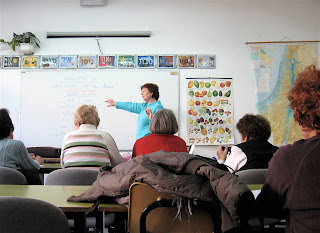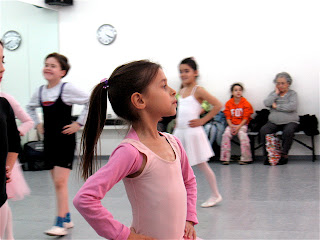 Assuming that, like my mother, I would live a full three-act life, I considered carefully the form and content of the third-third of mine. As the curtain rose on act three, I was hoping to shape a dramatic work that would incorporate meaningful new experiences and establish a sense of belonging to a land I where I was born yet barely knew. And so I made aliya (ascension, in Hebrew) in late 2002 and launched my bihemispheral life, splitting the years into near-equal parts between Atlanta, Georgia, and Tel Aviv.
Assuming that, like my mother, I would live a full three-act life, I considered carefully the form and content of the third-third of mine. As the curtain rose on act three, I was hoping to shape a dramatic work that would incorporate meaningful new experiences and establish a sense of belonging to a land I where I was born yet barely knew. And so I made aliya (ascension, in Hebrew) in late 2002 and launched my bihemispheral life, splitting the years into near-equal parts between Atlanta, Georgia, and Tel Aviv.Priority: update and retool
I was on terra firma in the northeast United States (from Manhattan to Boston; Washington, DC; and Atlanta). Yet living in Israel after decades of merely vicarious experiences (a rich Jewish education, including Hebrew language study at home, in school, at summer camp) and short stints to the motherland required jump-starting assimilation into my new-old home. While my Hebrew was OK, it lacked fluency in the slang and neologisms coined since the Hebrew Bible was canonized! (Toothbrush, computer, WIFI, parking lot, as examples, do not appear in the Five Books of Moses, no matter how closely I studied source texts and commentaries!)
Curriculum (draft)
 I aimed to improve my Hebrew immediately (next, learn Arabic) while steadily understanding better the social, historical, and political contexts of contemporary Israel and the cultural norms of my fellow Israelis. I wanted to explore how Herzl's dream, modern political Zionism — the international political movement that since the late 19th century has supported the ingathering of Jewish exiles to their ancestral homeland, had fared and morphed.
I aimed to improve my Hebrew immediately (next, learn Arabic) while steadily understanding better the social, historical, and political contexts of contemporary Israel and the cultural norms of my fellow Israelis. I wanted to explore how Herzl's dream, modern political Zionism — the international political movement that since the late 19th century has supported the ingathering of Jewish exiles to their ancestral homeland, had fared and morphed. "Learning Hebrew grammar is like learning math," said Leah, my language teacher at the Gordon ulpan, a center for the intensive study of Hebrew. "And, if you're good at either subject, you’re on your way to conquering the other." Hmm. My perfect excuse to forget learning grammar.
"Learning Hebrew grammar is like learning math," said Leah, my language teacher at the Gordon ulpan, a center for the intensive study of Hebrew. "And, if you're good at either subject, you’re on your way to conquering the other." Hmm. My perfect excuse to forget learning grammar.I discovered that studying the Middle East rigorously is endlessly complex and, endless. And, similar to the search for truth, studying yields a mass of opinions and interpretations, each tinted with bias, subjectivity, and contradiction.
What is a late learner to do?
How would I identify the evolving issues and changing demographics over the decades? Where were the quick tips on “getting” the confusing manners and mores? And who wrote the manual on following increasingly complex political and security matters, not to mention instructions on navigating government bureaucracies (Ministry of Immigrant Absorption, for instance) and negotiating with national health services and banks, among other institutions?
Short answer: I couldn’t find all the answers (nor ask all the questions) in one act, not even three! I needed to cobble Plan B: A fast path to figuring out my new-old home. The plan would become a Who, What, Why, Where, When, and How of a detective thriller (in development).
A blessing and two not-so-secret ingredients
- The blessing: A community of Israeli family and friends that provides support, caring, and vital life-affirming adventures, and with whom I observe the Jewish calendar and witness life cycle events. This blessing enhances my life's meanings, sharpens my values, and informs my choices. And, it helps cushion routine bumps and blows of immigration.
(To meet some players, visit Gila, Shimon, and Tova here; Noam and Aviah here; Noam; Daniel; Ohad and Aviah here; Ohad; Susanne; Shimon; my childhood friend; Miriam; and again, Ohad and Aviah.)
- Ingredient 1: Steadily attending weekly classes at ulpan and in a modern Israeli literature course (including doing homework and reading the assignments!).
- Ingredient 2: Regularly viewing documentary films in Hebrew at the Tel Aviv Cinemateque Library with the Librarian Dror's expert guidance. This lens on Israel's ancient multicultural history, its kaleidoscopic soul, and the passions that fuel it has been my key source of answers and more questions.
I am interested in your comments on points this post touches. If you have experience acclimating to bihemispheral living, expat living, overseas
 assignments, or even moving to another city or state in the same country — please share lessons you learned, tips, cheat sheets, how-to's, or handy hints on moving from surviving to thriving.
assignments, or even moving to another city or state in the same country — please share lessons you learned, tips, cheat sheets, how-to's, or handy hints on moving from surviving to thriving.

7 comments:
you are a rich woman! i now i have already told you, but i tell you again.
my experiences abroad are studying half a year in warsaw, poland and volunteering one and a half year in jerusalem, israel. so i am rich person, too, true. most important to me: the people i met then. some of them are still friends! other important things: to learn from different views, cultural backgrounds. often hard: dealing with the bureaucracy. but: there was always someone who helped! do you remember that we met by coincidence at misrad hapnim in jerusalem? this was like a present! i was pissed off by the pkidot there, but bumping into you and feeling that i have an ally there, someone who cared, rescued me!
and i am sure, when you look back now at the last "israel - act", you will also think of people who rescued you!
rich, aren't you?
neshikot
stefan
Read your last post. Thought it was beautiful and touching. And BTW stop being so harsh with yourself. Your Hebrew is better than 1/4 of Israelis.
Stefan — You remind me of that awful-funny experience at the Ministry of the Interior where immigrants, visa-seekers, students, and others have been known to line up at dawn for a chance to be yelled at and made angry if not crazy! It wasn't enough that you served your Austrian alternate military service working in the archives at Yad Vashem: You had to return to the Ministry every three months to renew your visa, and at no small cost. Yes, our chance meeting (and other "chance" meetings with cool people) can balance the challenges of dealing with bureaucracies and paying other costs of leaving one's safe and familiar turf.
Shimon — I accept your evaluation of my Hebrew proficiency level even if my ulpan teachers probably disagree with you! Thanks for the boost.
I am so proud of you. Exploring your heritage in real-life experience must be challenging and exhilarating. Few people are brave enough to leave the familiar and dive in so deep.
My biggest move was transitioning from a northern culture (New Jersey) to a very southern culture (South Carolina) as a teen. My lesson learned... listen, listen, listen before you speak. And appreciate the origin of your roots.
hi tamar, Neil here, i just finished reading exodus by leon uris, i realize it is like Israel "light" but it is a great story, anyway in around about fashion it got me thinking of you and i wanted to check out your blog, actually this is the first blog i have read. we had an amazing conference here in Atlanta that was so much fun, it is called "Limund" it is like going back to college for a day but with the local jewish community and great content. anyway, it amazing to read of your journey, you definitely are traveling the road with heart! the girls are amazing, Eliana had her kindergarten class come to our house to view the goats. N
People should read this.
I was fascinated to learn about your blog on Ronni Bennett's Time Goes By.I have a grandfather and two uncles buried in Jerusalem and a couple of living cousins in the Tel Aviv area. I contemplated making aliya some 60 years ago but never did. And so I get only vicarious pleasure watching Israel's successful growth into a great nation. I also split my time between two locations but far less dramatic than yours--New Jersey and Florida.
Post a Comment